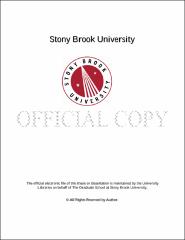| dc.identifier.uri | http://hdl.handle.net/11401/77733 | |
| dc.description.sponsorship | This work is sponsored by the Stony Brook University Graduate School in compliance with the requirements for completion of degree. | en_US |
| dc.format | Monograph | |
| dc.format.medium | Electronic Resource | en_US |
| dc.language.iso | en_US | |
| dc.publisher | The Graduate School, Stony Brook University: Stony Brook, NY. | |
| dc.type | Dissertation | |
| dcterms.abstract | This dissertation explores the development during the long eighteenth century of modern approaches to governing society through the management of the health and conduct of laboring populations: particularly slaves, sailors, soldiers, and the urban poor. Scholars generally study these groups separately. I argue, however, that their roles as providers of crucial, often coerced labor linked them in the eyes of social and political authorities. Further, members of these populations had in common poverty, heavy labor, and difficult living and working conditions, all of which made them seem especially and similarly vulnerable to health threats. Authorities--whether government officials, naval officers, or West Indian planters--thus tried to generalize techniques for overseeing the health and productivity of these " lower and servile orders of people." Focusing on Britain and Jamaica within the broader Atlantic and imperial contexts, my dissertation investigates this phenomenon by examining sources not usually considered together, such as government correspondence, medical manuals, natural histories, and sugar plantation records. This approach reveals interconnected strategies for managing mass populations across distant sites. In addition, it shows how these strategies became crucial features of new approaches to governing society long before most scholarship has acknowledged. In doing so, it sheds new light on how the practices of governing across the British Atlantic during the long eighteenth century reflected local and global social anxieties and ideas for managing bodies over an extra-territorial expanse. Situating this study in a comparative Atlantic context, then, raises questions about the colony-metropole dyad that focus on the colonial production of the practices, not just the theories, of governing and their transformations in different contexts. Consequently, my work shows modern governance as a product of colonies and imperial center together, rather than as a product of the center that then flowed out to colonies. This dissertation thus contributes to our understanding of the complex transitions between early modern and modern governance, and their relation to the state, nation, and empire. | |
| dcterms.available | 2017-09-20T16:53:27Z | |
| dcterms.contributor | Landsman, Ned | en_US |
| dcterms.contributor | Wilson, Kathleen | en_US |
| dcterms.contributor | Anderson, Jennifer | en_US |
| dcterms.contributor | Brewer, Holly. | en_US |
| dcterms.creator | Tomlinson, Tristan | |
| dcterms.dateAccepted | 2017-09-20T16:53:27Z | |
| dcterms.dateSubmitted | 2017-09-20T16:53:27Z | |
| dcterms.description | Department of History. | en_US |
| dcterms.extent | 296 pg. | en_US |
| dcterms.format | Monograph | |
| dcterms.format | Application/PDF | en_US |
| dcterms.identifier | http://hdl.handle.net/11401/77733 | |
| dcterms.issued | 2015-08-01 | |
| dcterms.language | en_US | |
| dcterms.provenance | Made available in DSpace on 2017-09-20T16:53:27Z (GMT). No. of bitstreams: 1
Tomlinson_grad.sunysb_0771E_11870.pdf: 1635362 bytes, checksum: ed9e798edb0233c1af3f9fe9906afc6b (MD5)
Previous issue date: 2014 | en |
| dcterms.publisher | The Graduate School, Stony Brook University: Stony Brook, NY. | |
| dcterms.subject | Britain, governance, health, Jamaica, population, slavery | |
| dcterms.subject | History | |
| dcterms.title | The Ills of Empire: Managing Health and Populations across the British Atlantic World, 1707-1834 | |
| dcterms.type | Dissertation | |

